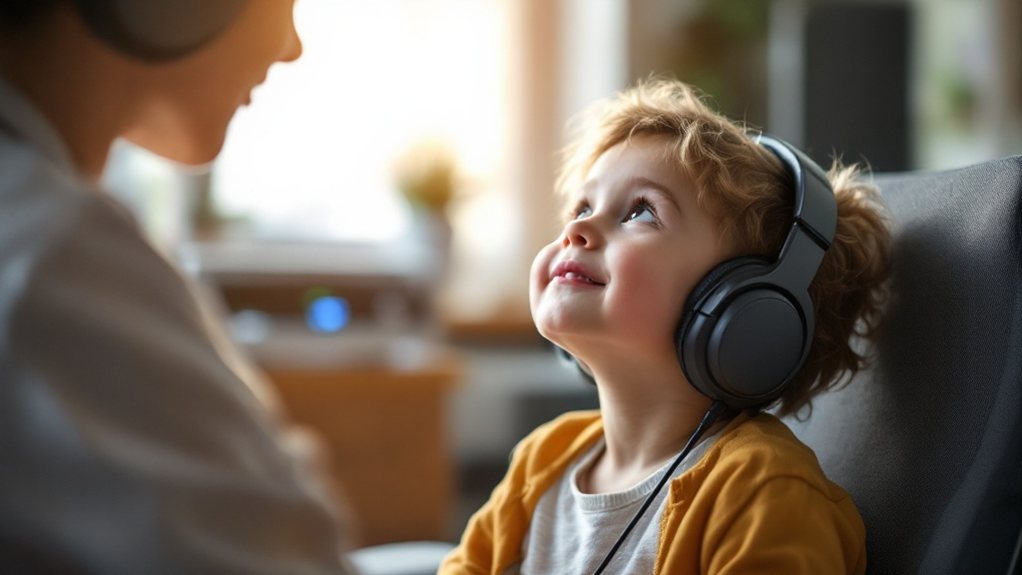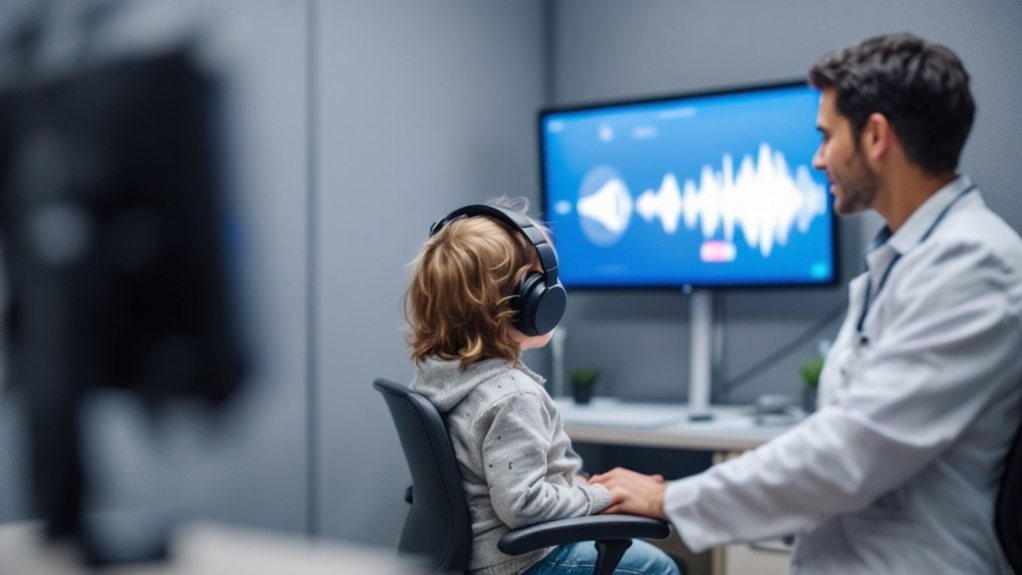Are you looking for Children Hearing Test Loganlea?
Ready to take the first step towards better hearing?
Let’s talk!
Connect with us today! Fill out the contact form below to schedule your personalised hearing consultation at All Things Hearing. Our expert team is committed to guiding you on your journey to improved hearing health. Don't wait to enhance your quality of life. Reach out now – we're here to listen and help!
Follow us:
Our main hearing clinic is located in Greenbank and our visiting sites are located in Daisy Hill, Jimboomba, Parkinson, and Wishart. You’re considering a hearing test for your child with All Things Hearing, which is crucial for their development. It’s essential to detect potential issues early, as it can impact their learning and communication skills.
You’ll want to know the signs of hearing loss, like lack of response to sounds or speech development issues. A specialist from All Things Hearing will examine your child’s ears and use techniques like Pure Tone Audiometry or Otoacoustic Emissions.
As you learn more about the process, you’ll discover how to prepare your child and understand the test results, which will help you make informed decisions about their hearing health, with All Things Hearing providing their hearing services in the area.
Why Hearing Tests Matter

A child’s hearing test is crucial because it can detect potential issues that might affect their ability to learn and communicate. You’ll want to ensure your child’s hearing is tested regularly, especially if you’ve noticed any signs of difficulty hearing. It’s essential to identify any problems early on, as untreated hearing issues can lead to developmental delays. If you’re a parent, you’ll likely be asked about your child’s hearing and communication skills during the test.
You should be prepared to provide information about your child’s medical history, including any ear infections or exposure to loud noises. The test itself is usually quick and painless, and it can be adapted to suit your child’s age and needs. You’ll get the results immediately, and if any issues are detected, you can discuss the next steps with the tester. It’s vital you take your child’s hearing test seriously, as it can significantly impact their future.
Signs Of Hearing Loss
Because you want to ensure your child’s hearing is optimal, it’s essential to recognize signs of hearing loss, which can be subtle, especially in young children. You should be aware that they might not always be able to communicate their hearing difficulties. If you notice your child isn’t responding to sounds, it’s a cause for concern. They might not turn their head when you call their name or react to loud noises.
You should also watch for signs of difficulty with speech development, such as delayed speech or struggling to articulate words. It’s not uncommon for children with hearing loss to have trouble following instructions or understanding conversations, especially in noisy environments. If you’ve noticed any of these signs, it’s crucial that you don’t dismiss them. You should take action and seek professional advice to determine the cause and extent of the problem. It’s essential to address hearing loss early to prevent potential developmental delays.
Hearing Test Procedures

Having identified potential signs of hearing loss, you’re likely wondering what’s involved in a hearing test for your child. You’ll take your child to an audiologist or an ear, nose, and throat specialist who’ll conduct the test. The specialist will start by asking you questions about your child’s medical history and any symptoms you’ve noticed. They’ll also examine your child’s ears to check for any visible problems.
The actual test will depend on your child’s age and ability to cooperate. You’ll be asked to accompany your child during the test to help them feel comfortable and secure. The specialist may use various techniques to assess your child’s hearing, and you’ll be informed about the results immediately after the test. It’s essential to follow the specialist’s instructions carefully to ensure accurate results. You’ll also have the opportunity to ask questions and discuss any concerns you may have about your child’s hearing.
Types Of Hearing Tests
Your child’s hearing test will involve one or more of several types of assessments, depending on their age and specific needs. You’ll find that some tests are more suitable for younger children, while others are better for older kids. For instance, Pure Tone Audiometry is a common test that measures your child’s ability to hear different sounds and frequencies. It’s usually used for kids who are old enough to respond to sounds.
Other types of hearing tests include Tympanometry, which checks the middle ear’s function, and Otoacoustic Emissions (OAE), which assesses the cochlea’s function. You might also encounter Behavioral Observation Audiometry, which observes your child’s reactions to sounds. It’s essential to note that the type of test used will depend on your child’s age, hearing loss severity, and other factors. The audiologist will choose the most suitable test to evaluate your child’s hearing accurately. These tests will help determine the best course of action for your child’s hearing health.
Preparing Your Child

Several days before the hearing test, it’s essential you prepare your child for what they’ll experience. You’ll want to explain the test in a way that’s easy for them to understand. Let them know that it’s not a test they can pass or fail, and that it’s just a way to check their hearing. You can also reassure them that it won’t hurt and that they’ll be able to ask for breaks if they need to.
You should also prepare your child by explaining what will happen during the test. They’ll likely be asked to wear headphones and respond to sounds they hear. You can practice this with them at home to help them feel more comfortable. It’s also a good idea to bring a favorite toy or book to the test to help them relax. By preparing your child ahead of time, you can help reduce their anxiety and make the test experience less stressful for both of you. This will help things go more smoothly on the day of the test.
Understanding Test Results
Now that you’ve prepared your child for the hearing test, it’s time to think about what comes next. You’ll receive the test results, which will indicate whether your child has any hearing issues. The results may show that your child’s hearing is normal, or they may reveal some degree of hearing loss. It’s essential to understand that hearing loss can vary in severity and type.
You should ask the audiologist to explain the results in a way that’s easy for you to understand. They’ll likely use charts and graphs to illustrate your child’s hearing abilities. If the results indicate hearing loss, you’ll want to know the cause and the potential impact on your child’s daily life. The audiologist will discuss the test findings with you, and you should feel free to ask questions. It’s crucial to clarify any concerns you have about your child’s hearing test results, so don’t hesitate to ask for clarification.
Treatment Options Available
Having identified the extent of your child’s hearing loss, it’s time to explore treatment options that can help improve their hearing and overall quality of life. You’ll work with an audiologist or an ear, nose, and throat specialist to determine the best course of treatment. Depending on the severity of your child’s hearing loss, they may recommend hearing aids, cochlear implants, or other assistive devices.
You should consider the pros and cons of each option, including the potential benefits and drawbacks. For example, hearing aids can improve your child’s ability to hear and communicate, but they may not completely restore their hearing. Cochlear implants, on the other hand, can provide a sense of sound to those who are profoundly deaf, but they require surgery and may have potential risks. It’s essential to discuss these options with your child’s healthcare provider to determine the best treatment plan for their specific needs.
Disclaimer
The content on our site is purely for education and should not be seen as an endorsement or recommendation of any treatments or products without a thorough hearing assessment and evaluation. Before starting any treatment, users should get advice from a professional and be fully aware of any potential side effects or risks related to the procedures. Any products we mention cannot be purchased by the public without first consulting a hearing health expert.
